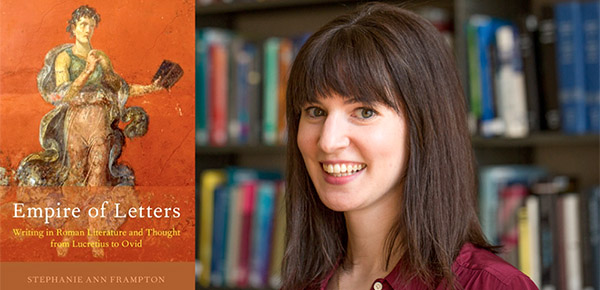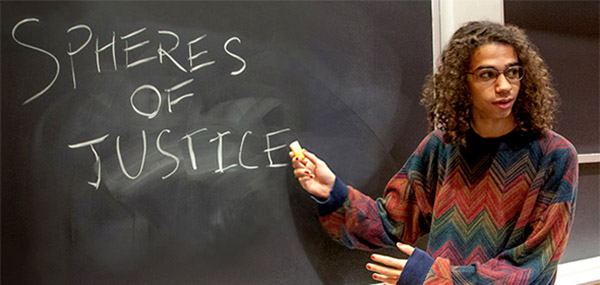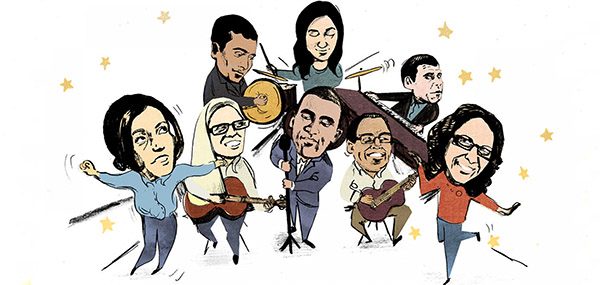SAID AND DONE
January 2019
MIT School of Humanities, Arts, and Social Sciences

QUOTABLE
"Engineers need concrete tools they can use to identify, address, and communicate about the ethical aspects of their projects. In this hands-on course we’ll teach an ethics protocol, a step-by-step process that students can apply to their own projects."
— Abby Everett Jaques PhD '18, MIT Philosophy
NEW RESEARCH
When Japan met the world | Hiromu Nagahara
Inspired by a family background with extensive U.S-Japan ties, Nagahara explores Japan’s cultural links to other societies.
Story by Peter Dizikes, MIT News
INTERNATIONAL STUDIES
Case Studies in Populism
Starr Forum panel discusses countries where a rise in populism and authoritarian populist leaders have endangered basic civil liberties and spawned intolerant rhetoric.
Story by the Center for International Studies
LITERATURE
How writing technology shapes the mind | Stephanie Frampton
Monumental writing in stone and bronze, papyrus scrolls, erasable wax tablets, the alphabet itself: In her new book, Frampton shows how such writing technologies shaped the ancient Roman mind, including how the Romans “thought about thought.”
Story by Peter Dizikes, MIT News
"Tablets became a common Roman metaphor for how our brains work: They thought “the mind is like a wax tablet where you can write and erase and rewrite. The way we talk about the mind now is that it’s a computer. We think about the computer in the same way that intellectuals in Rome were thinking about writing on wax tablets.”
— Stephanie Frampton, Associate Professor of Literature
MUSIC, ENGINEERING, AND THEATER ARTS
Spider web music: A harmony of art and science
"Spider’s Canvas," which features the sonification of a 3-D spider web, was designed, constructed, and performed by a multi-disciplinary team of MIT musicians, computer scientists, composers, and theater technologists.
Story by Civil and Environmental Engineering
ECONOMICS
A new understanding of how cartels work | Alexander Wolitzky
Wolitzky's paper, a rethinking of an important policy topic, finds that less data-sharing among firms can actually lead to more collusion.
Story by Peter Dizikes, MIT News
RESEARCH-BASED ARTS PRACTICE
"Nervous/System" launches MIT Performing series
This remarkable production kicked off MIT Performing, a prototyping/presenting platform for contemporary, research-based artistic practice. The new series is curated by Jay Scheib, MIT Professor of Theater Arts, for CAST, the MIT Center for Art, Science & Technology.
Story by Arts at MIT | MIT Performing 2018-2019 Season
Recent Media Coverage + Awards
INSIDE THE CLASSROOM
PHILOSOPHY AND AI
Ethical AI by Design | Abby Everett Jaques PhD'18
Postdoctoral associate Jaques is bringing philosophical tools to ethical questions related to information technologies. In an IAP workshop and in a new philosophy class, Ethics of Technology, she is teaching an ethics protocol, a step-by-step process that students can apply to their own projects.
Story by the MIT Quest for Intelligence
POLITICAL SCIENCE
Justice
In Bernardo Zacka's 17.01 class MIT students explore human values and competing theories of justice. Students emerge with a nuanced and useful map — one that shows how power operates, as well as the many forms that justice and injustice can take.
Story by SHASS Communications
GLOBAL STUDIES & LANGUAGES
The politics of beauty | Sefa Yakpo
For her senior thesis, Yakpo, a major in French and management science, explores identity, hair, and politics of beauty among Francophone African women.
Story by Global Studies and Languages
PHILOSOPHY + SCIENCE, TECHNOLOGY AND SOCIETY
Connecting philosophy, social justice, public policy, and feminism | Marion Boulicault
PhD Philosophy student Boulicault, working at the intersection of science and the humanities, says "I think the broader MIT ethos could be informed by paying more attention to the scholars in HASTS [MIT Program in History/Anthropology/and Science, Technology and Society] and philosophy who are asking questions like: ‘In what ways is technology social and how might it be assuming or amplifying existing and possibly problematic social ideas?’”
Story by the Office of Graduate Education 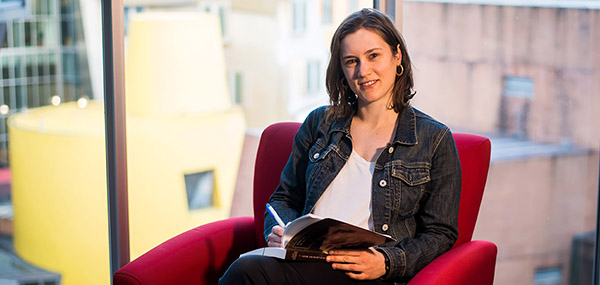
Philosophy PdD student Marion Boulicourt; photo by Joseph Lee
PHILOSOPHY + EECS
Philosophy and EECS major Jessy Lin programs for social good
“There are a lot of ideas in AI and language-learning that tie into ideas from philosophy,” Lin says. “How the mind works, how we reason about things in the world, what concepts are.”
Story by Gina Vitale, MIT News
MUSIC
Music technology accelerates at MIT
An increasingly popular program is drawing students eager to build — and use — the next generation of tools for making music.
Story by SHASS Communications | Video by Melanie Gonick, MIT News
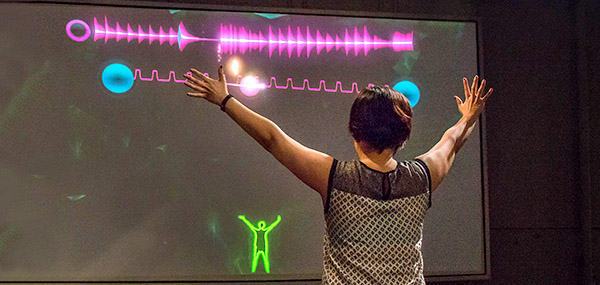
Electronic Music Workshop with Eran Egozy, Professor of the Practice; photo by L Barry Hetherington
WHAT POLICIES CAN NARROW THE ECONOMIC DIVIDE?
THE ECONOMIC DIVIDE
The new urban divide | David Autor
“It’s not clear where the land of opportunity is for non-college adults,” says MIT economist David Autor, who presented his recent findings at the American Economic Association meeting in January. The data suggests that income inequality will likely get worse. There will still be good jobs for the highly educated, he says, but there's no "renaissance of opportunity" in the pipeline for workers without a college education.
Autor's presentation | Stories: NPR | Bloomberg | The New York Times
THE ECONOMIC DIVIDE
How to narrow the economic divide
In this special report from Fortune, MIT development economist Esther Duflo and others offer ideas for alleviating growing economic inequalities. Duflo thinks big gains can emerge from small steps that keep the poor from falling through the existing safety net.
Story at Fortune Magazine
FEATURE | INSTITUTE PROFESSOR JOHN HARBISON
The composer-in-chief | John Harbison
New commissions, world premieres of his compositions, and the publication of his first book, What Do We Make of Bach?, have created a whirlwind season for Harbison, who turned 80 in December 2018.
Story at Isthmus | Book: What Do We Make of Bach?
At 80, John Harbison continues to look ahead
By his own admission, John Harbison was never a composer who spent much time thinking retrospectively about his own legacy. “For many years, I took the attitude, and would counsel composers in general, to just go forward,” he said during a recent phone interview.
Profile at The Boston Globe
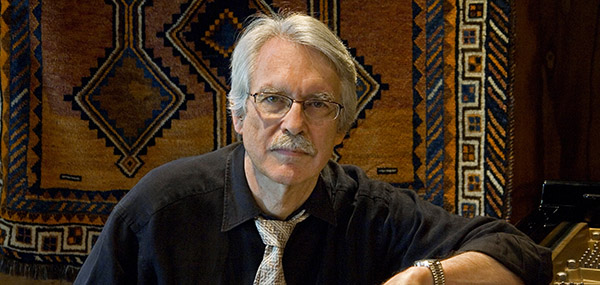
John Harbison, Institute Professor; photo by Tom Artin
"One project in the works is Sonata for Viola and Piano that Harbison is composing for Sally Chisholm, a professor of music and violist with the Pro Arte Quartet. 'The writing is brilliant,' says Chisholm, 'and that of a composer at the height of his power.'"
IN THE MEDIA
TAX POLICY
Rep. Ocasio-Cortez’s 70 percent tax: The research behind the proposal
Institute Professor emeritus Peter Diamond and MIT alumnus Emmanuel Saez relaunched this debate with a landmark 2012 paper that argued for a 73% top income tax rate in the US. Diamond says the rate will raise money to offset shortfalls and to "help us prepare for the large costs coming from climate change.”
Story at WBUR | Story at Vox
SCIENCE WRITING
"Reasonable doubt" on climate change is killing the planet | Tom Levenson
"They're treating climate researchers' willingness to acknowledge the limits of their findings — as all reputable scientists do — as evidence of lingering doubts that relieve us of any obligation to address the problem at all."
Commentary at the Boston Globe
ECONOMICS
The decade's eight best economists
Of the eight selected, two are MIT economics professors and five are MIT economics graduates. "Taken together, they display an impressive combination of clever empiricism and serious-minded wonkery."
Story at The Economist
For all recent coverage visit In the Media + Awards
STAY IN TOUCH
Follow us
![]()
![]()
Subscribe to Said and Done
Nine editions a year
In the Media
Recent coverage
Research Impact
Explore
SHASS on MIT News
Research and Features
MIT Campaign for a Better World
Story | Join Us
Videos
Watch

Said and Done is published by SHASS Communications
Office of the Dean, MIT School of Humanities, Arts, and Social Sciences
Editor and Designer: Emily Hiestand
Publication Associate: Alison Lanier
Published 17 January 2019
